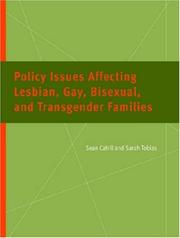| Listing 1 - 3 of 3 |
Sort by
|

ISBN: 1282644564 9786612644566 0472024892 9780472024896 0472030612 9780472030613 0472904132 Year: 2007 Publisher: Ann Arbor : University of Michigan Press,
Abstract | Keywords | Export | Availability | Bookmark
 Loading...
Loading...Choose an application
- Reference Manager
- EndNote
- RefWorks (Direct export to RefWorks)
Sexual minorities --- Gay couples --- Lesbian couples --- Children of sexual minority parents --- Gender minorities --- GLBT people --- GLBTQ people --- Lesbigay people --- LBG people --- LGBT people --- LGBTQ people --- Non-heterosexual people --- Non-heterosexuals --- Sexual dissidents --- Minorities --- Sexual minority parents' children --- Sexual minority parents --- Family relationships --- Legal status, laws, etc. --- LGBTQ+ families. --- LGBTQ+ parents. --- Children of LGBTQ+ people.
Book
ISBN: 1479879657 9781479879656 9781479857647 1479857645 Year: 2015 Publisher: New York, NY
Abstract | Keywords | Export | Availability | Bookmark
 Loading...
Loading...Choose an application
- Reference Manager
- EndNote
- RefWorks (Direct export to RefWorks)
The decision to have a child is seldom a simple one, often fraught with complexities regarding emotional readiness, finances, marital status, and compatibility with life and career goals. Rarely, though, do individuals consider the role of the law in facilitating or inhibiting their ability to have a child or to parent. For LGBT individuals, however, parenting is saturated with legality – including the initial decision of whether to have a child, how to have a child, whether one’s relationship with their child will be recognized, and everyday acts of parenting like completing forms or picking up children from school. Through in-depth interviews with 137 LGBT parents, Amanda K. Baumle and D’Lane R. Compton examine the role of the law in the lives of LGBT parents and how individuals use the law when making decisions about family formation or parenting. Baumle and Compton explore the ways in which LGBT parents participate in the process of constructing legality through accepting, modifying, or rejecting legal meanings about their families. Few groups encounter as much variation in access to everyday legal rights pertaining to the family as do LGBT parents. This complexity and variation in legal environments provides a rather unique opportunity to examine the manner in which legal context affects the ways in which individuals come to understand the meaning and utility of the law for their lives. The authors conclude that legality is constructed through a complex interplay of legal context, social networks, individual characteristics, and familial desires. Ultimately, the stories of LGBT parents in this book reflect a rich and varied relationship between the law, the state, and the private family goals of individuals.
Sexual minorities' families --- Gay parents --- Children of gay parents --- Same-sex marriage --- Families --- Children of gay men --- Children of homosexual parents --- Children of lesbians --- Gay parents' children --- Law and legislation --- LGBTQ+ families. --- Children of LGBTQ+ people. --- LGBTQ+ adoptive parenthood. --- LGBTQ+ parenthood. --- Parental rights. --- LGBTQ+ parents.
Periodical
Abstract | Keywords | Export | Availability | Bookmark
 Loading...
Loading...Choose an application
- Reference Manager
- EndNote
- RefWorks (Direct export to RefWorks)
Sexual minorities --- Sexual minorities' families --- Lesbians --- Gays --- Bisexuals --- Transgender people --- Gender-nonconforming people --- Family relationships --- Gender-creative people --- Gender-independent people --- Gender-non-normative people --- Gender-variant people --- Genderqueer people --- Non-binary people --- Persons --- Bi people --- Bis (Bisexuals) --- Bisexual people --- Gay people --- Gay persons --- Homosexuals --- Female gays --- Female homosexuals --- Gay females --- Gay women --- Gayelles --- Gays, Female --- Homosexuals, Female --- Lesbian women --- Sapphists --- Women, Gay --- Women homosexuals --- Women --- Families --- Gender minorities --- GLBT people --- GLBTQ people --- Lesbigay people --- LBG people --- LGBT people --- LGBTQ people --- Non-heterosexual people --- Non-heterosexuals --- Sexual dissidents --- Minorities --- Sexual minorities' families. --- Family relationships. --- LGBTQ+ families --- LGBTQ+ parenthood --- LGBTQ+ family members --- LGBTQ+ family planning --- Children of LGBTQ+ people --- LGBTQ+ personal and family law
| Listing 1 - 3 of 3 |
Sort by
|

 Search
Search Feedback
Feedback About UniCat
About UniCat  Help
Help News
News